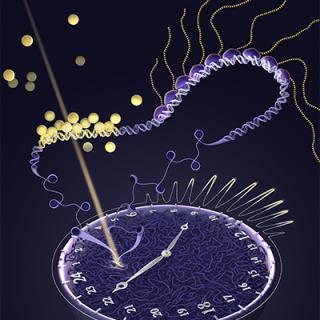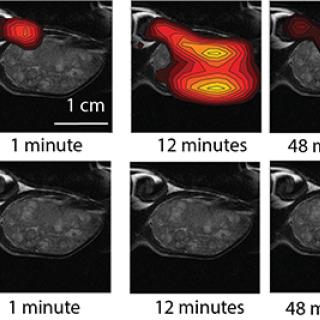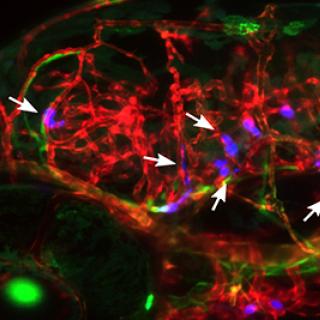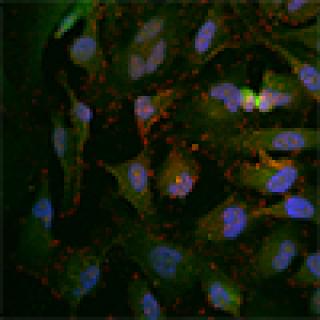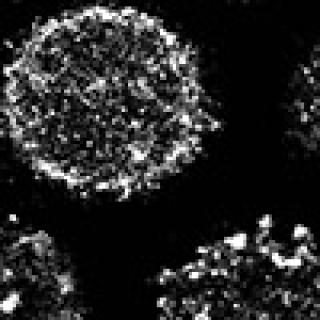Our Discoveries
Computational analysis leads to potential new drug combination for pancreatic cancer
A computer analysis has been able to predict that low levels of asparagine, an amino acid required for protein synthesis, combined with the shutdown of a stress response pathway can lead to reductions in the fitness of a tumor. These combined findings could potentially lead to new combination therapies to treat aggressive tumors, such as those found in pancreatic cancers.
Read MoreDiversity of liver cancer cells can impede tumors’ response to immunotherapy
New research from the NCI’s Center for Cancer Research shows that understanding the impacts of cellular diversity on liver tumors’ microenvironment suggests ways to make immunotherapy effective for more patients.
Read MoreAdvanced imaging technology reveals pulsed hormone release regulates gene transcription
Using advanced microscopic imaging technology, CCR investigators have correlated a pulsed pattern of hormone release with bursts of transcription, the process in which the genetic information encoded by DNA is written into RNA. They are the first researchers to observe this process at a gene-specific level.
Read MoreTumor composition of melanoma indicates potential responses to immunotherapy
The number of genetic mutations in a tumor is thought to influence how well melanoma may respond to immunotherapy, but new research in mice and supported by preliminary human data reveals that the diversity of mutations within a tumor may be a better indicator of response to therapy.
Read MoreFDA grants breakthrough therapy designation for new CAR T-cell therapy for B-cell acute lymphoblastic leukemia
In August 2019, the U.S. Food and Drug Administration granted breakthrough therapy designation to an experimental immunotherapy being developed in the Center for Cancer Research (CCR) for the treatment of B-cell acute lymphoblastic leukemia (ALL), a type of blood cancer. The designation will advance CCR’s development and testing of an immunotherapy for children and young adults whose B-cell ALL is resistant to CD19-targeted immunotherapies.
Read MoreResearchers develop a new imaging technique to measure cancer metabolism
CCR researchers have developed a new technique to show metabolism from MRI images by reducing the amount of noise in those images, resulting in significantly improved quality. This breakthrough enables researchers to see biochemical processes, paving the way for a deeper understanding of tumors and potentially improved diagnosis and treatment.
Read MoreTumor cells in transparent fish reveal physical and molecular factors that determine metastasis sites
CCR researchers used zebrafish to discover that particular sites colonized by migrating tumor cells are determined by both the physical architecture of tissue and the cells’ molecular compatibility with their microenvironment.
Read MoreFDA grants breakthrough therapy designation of new TIL therapy for advanced cervical cancer
In May 2019, the FDA granted breakthrough therapy designation to a tumor-infiltrating lymphocyte (TIL) therapy technology known as LN-145 to treat advanced cervical cancer based on data presented by CCR collaborator Iovance Biotherapeutics.
Read MoreIn patients with severe chronic lymphocytic leukemia, B cells get stuck in hyperactive mode
Analyzing how cancer cells respond to stress signals could help clinicians assess the severity of disease in patients with chronic lymphocytic leukemia, according to new research from the Center for Cancer Research, Memorial Sloan Kettering Cancer Center and the National Heart, Lung and Blood Institute.
Read MoreNew mechanism for regulating differentiation discovered in human embryonic stem cells
Researchers in the Center for Cancer Research have discovered a new mechanism involving a nuclease complex called the RNA exosome that represses differentiation of human embryonic stem cells. This represents the first time this mechanism has been studied in these cells.
Read More

